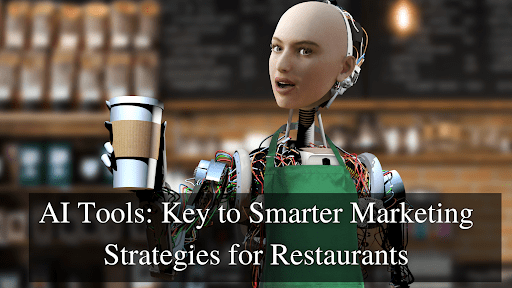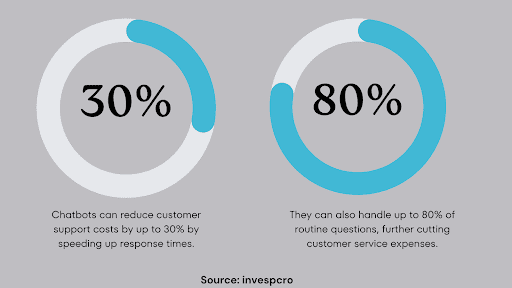AI Tools: Key to Smarter Marketing Strategies for Restaurants

Are you a restaurant owner or marketer looking to stay ahead in today’s competitive landscape? Artificial Intelligence (AI) is revolutionizing how restaurants engage customers and optimize operations.
By harnessing AI tools, you can make data-driven decisions, personalize experiences, and streamline processes like never before.
The AI Revolution in Restaurant Marketing
AI is no longer a futuristic concept; it’s a present-day reality transforming various industries, including the restaurant business. By harnessing the power of machine learning algorithms, AI tools can analyze vast amounts of data and uncover valuable insights that would be nearly impossible for humans to detect manually.
This paradigm shift has paved the way for restaurants to leverage AI for restaurant marketing, enabling them to make data-driven decisions, personalize customer experiences, and streamline operations like never before.
Integration of AI in Customer Relationship Management (CRM)
At the heart of any successful marketing strategy lies the ability to understand and cater to customer preferences. This is where the integration of AI in CRM for restaurants shines.
Personalized Marketing Campaigns
By analyzing vast troves of customer data, including purchase histories, social media interactions, and demographic information, AI algorithms can identify patterns and preferences that would be nearly impossible for humans to discern. Armed with these insights, restaurants can tailor their marketing campaigns to resonate with individual customers, increasing engagement and driving loyalty.
| AI-powered CRM activities could increase business revenues by $1.1 trillion. |
Automated Customer Interactions
In addition to personalized campaigns, AI-driven chatbots and virtual assistants can streamline customer interactions, from booking reservations to addressing inquiries and resolving complaints. These automated marketing solutions not only enhance the customer experience but also free up valuable staff time, allowing restaurants to focus on other critical aspects of their operations.
AI Chatbots: Revolutionizing Customer Interactions
One of the most promising applications of AI in the restaurant industry is the rise of AI chatbots. These conversational AI assistants can transform how restaurants interact with customers, streamlining communication and providing personalized support.

Benefits of AI Chatbots
- 24/7 Availability: Chatbots can handle customer inquiries, and provide information round-the-clock, ensuring customers always have access to support.
- Personalized Engagement: AI chatbots can analyze customer preferences and past interactions to offer tailored recommendations, enhancing the dining experience.
- Multilingual Support: Restaurants can deploy chatbots capable of conversing in multiple languages, catering to a diverse customer base.
- Reduced Wait Times: By handling routine queries and tasks, chatbots can significantly reduce wait times and improve customer satisfaction.
AI-Driven Analytics for Strategic Decision Making
Data is the lifeblood of any successful business, and restaurants are no exception. By leveraging AI-driven analytics for restaurants, establishments can gain a deeper understanding of customer behavior, market trends, and operational inefficiencies.
Predictive Analytics
AI algorithms can analyze historical data and identify patterns that can be used to predict future customer behavior, peak times, and potential churn. This predictive analytics in hospitality equips restaurants with the foresight to make informed decisions about staffing, inventory, and marketing strategies, ultimately reducing costs and improving efficiency.
Sentiment Analysis
In the age of social media, a restaurant’s reputation is more crucial than ever. With AI-powered sentiment analysis, restaurants can monitor and analyze customer reviews, social media mentions, and online conversations in real-time. These AI-driven customer insights enable establishments to promptly address any concerns, manage their online reputation, and identify areas for improvement.
| “Businesses that use AI in their customer journey saw an increase of up to 20% in customer satisfaction.” – Zipdo |
Optimizing Menu Design and Management with AI Tools
One of the most significant advantages of AI in the restaurant industry is its ability to optimize menu design and management, leading to increased sales and customer satisfaction.
AI Menu Customization
By analyzing customer preferences, seasonal trends, and sales data, AI algorithms can suggest menu adjustments that cater to customer demands. This AI menu customization not only enhances the dining experience but also helps restaurants maximize their profits by offering popular and profitable dishes.
AI in Restaurant Inventory Management
Efficient inventory management is crucial for minimizing waste and ensuring consistent product availability. AI tools can analyze historical data, predict future demand, and provide recommendations for optimal inventory levels. This AI in restaurant inventory management approach helps restaurants reduce costs and maintain high levels of customer satisfaction.
Enhanced Customer Experience through AI
Beyond optimizing internal operations, AI tools can directly enhance the customer experience, creating a more personalized and seamless dining journey.
Table Management and Waitlist Optimization
AI applications can streamline table management and waitlist processes, reducing wait times and ensuring efficient seating arrangements. By analyzing real-time data on table availability, party sizes, and customer preferences, restaurants can provide a smoother and more enjoyable AI customer experience.
Personalized Dining Experience
AI algorithms can analyze customer preferences, past orders, and other data to suggest personalized menu items, wine pairings, and dining experiences. This level of personalization in restaurant marketing not only delights customers but also increases the likelihood of repeat visits and positive word-of-mouth referrals.
AI in Marketing Content Creation and Management
AI tools can revolutionize the way restaurants create and manage their marketing content, ensuring maximum visibility and engagement.
Content Personalization
By leveraging AI algorithms, restaurants can create dynamic content that adapts to individual customer preferences, interests, and behavior. This AI content creation in marketing approach ensures that each customer receives relevant and engaging content, increasing the likelihood of conversions and customer loyalty.
SEO and Online Presence
AI-powered SEO tools and content optimization strategies can help restaurants enhance their online visibility and reach their target audience more effectively. By analyzing search trends, competitor strategies, and user behavior, AI tools can suggest optimizations that improve search rankings and drive more organic traffic.
Real-World Examples: AI Transforming Restaurants
Many top restaurants and food brands are already using AI in innovative ways to improve customer service, operations, and growth.
- Domino’s Pizza launched an AI chatbot called “Dom” in 2017. Customers can use it to order pizza and track deliveries by messaging the chatbot.
- Starbucks introduced the “My Starbucks Barista” AI chatbot in 2017. It suggests personalized drink orders and helps process customer orders.
- In 2021, NVIDIA created an AI-powered “talking kiosk” called Project Tokkio. Restaurants can use it for self-service ordering and payments.
- NVIDIA is working on an AI robot delivery system called Postmates. The robots can deliver food orders by finding the best routes and avoiding obstacles.
- In 2022, Magna International tested an AI-powered pizza delivery robot. It aims to reduce delivery costs and emissions.
- Since 2021, OpenTable has used AI to give personalized restaurant recommendations and dynamic pricing to users booking reservations.
- spoon.tech uses AI to turn restaurant tasks like recipes and administration into engaging games, helping staff learn processes easily.
These examples show how AI can improve customer service, automate operations, optimize deliveries, and train employees in fun ways. Despite the opportunities, restaurants must plan carefully to address AI integration challenges.
Challenges and Solutions
- Data Quality: AI algorithms rely heavily on the quality and quantity of data available. Restaurants must invest in robust data collection and cleaning processes to ensure accurate insights.
- Privacy and Security: As AI tools collect and analyze customer data, it is essential to implement robust security measures and adhere to data privacy regulations to maintain customer trust.
- Implementation and Training: Successful AI integration requires a well-planned implementation strategy and comprehensive training for staff to ensure seamless adoption and effective use of the new tools.
Frequently Asked Questions (FAQs)
1. What initial steps should a restaurant take to start integrating AI into its marketing strategy?
The first step is to conduct a comprehensive audit of your current marketing practices, data collection processes, and technological infrastructure. This will help identify areas where AI can provide the most significant impact and ensure that you have the necessary data and resources to support AI implementation. Additionally, research and evaluate various AI tools tailored to your specific needs and budget.
2. How can AI tools help in managing the reputation of a restaurant?
AI-powered sentiment analysis tools can monitor online reviews, social media mentions, and other digital conversations in real-time. This enables restaurants to promptly address any negative feedback, respond to customer concerns, and identify areas for improvement. By proactively managing their online reputation, restaurants can maintain a positive brand image and increase customer trust and loyalty.
3. Are there cost-effective AI solutions for small or mid-sized restaurants?
Absolutely! While some AI tools may require significant upfront investment, numerous scalable and cost-effective solutions are available for smaller establishments. Many AI service providers offer subscription-based models or pay-as-you-go pricing, ensuring that restaurants can leverage the power of AI without breaking the bank. Additionally, the long-term cost savings and increased efficiency facilitated by AI can provide a high return on investment (ROI) for businesses of all sizes.
Embrace the Future of Restaurant Marketing with AI
Restaurants embracing AI will gain an unbeatable competitive edge. Take the first step towards transforming your marketing by exploring the AI tools outlined here. Invest in this digital revolution and watch your efforts soar, delighting customers and driving remarkable growth.







